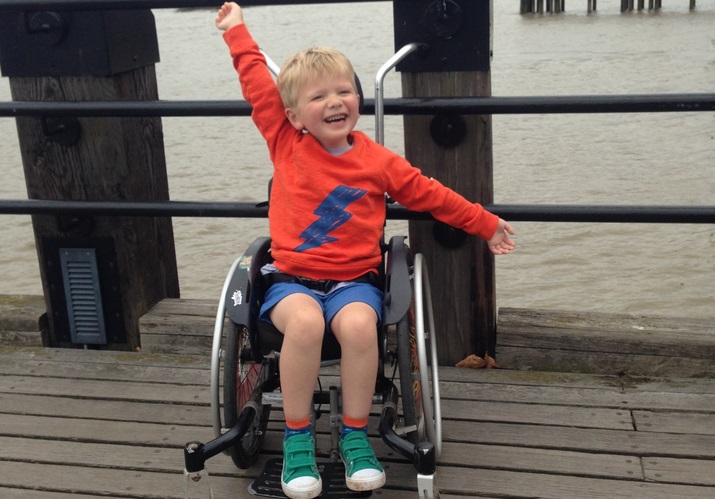The story of Ali
Bertie is eight and, in addition to loving rock music, has a rare form of muscular dystrophy called Ullrich congenital muscular dystrophy (UCMD). This is a genetic conditon with an incidence of about one in a million. We didn’t know he had muscular dystrophy until he was three but we very much knew that something wasn’t right.
A few days after he was born we noticed Bertie had swollen feet. The registrar ran some tests and then told us not to google it but that he thought Bertie might have a chromosome disorder. He ordered karyotype testing but the results came back normal. “I am very surprised”, he said. “Your son has very wide-set eyes”. We were sent home with no answers.
After several months the swelling in Bertie’s feet went down, however Bertie always seemed very floppy and heavy compared to when his siblings were babies. His head seemed very heavy for him to hold up, he didn’t seem to know what to do with his legs when he was in bay bouncers and them he missed his motor milestones. By eighteen-months-old, with the swelling gone and no irregularities having been identified in his chromosomes, our local hospital wanted to discharge him. We were shocked because it was so obvious to us that he wasn’t progressing in the way his siblings had. We asked for a referral to physio but the response was reluctant and we were told he just had poorly formed feet and would eventually walk.
We continued to be concerned and when Bertie was two, with the help of a health visitor, we managed to see a physiotherapist. After observing his struggles to walk and grip things, she set us off on the path to the right diagnosis. We are so grateful for her intervention. Nonetheless we still had a long way to go on our journey to understanding why Bertie was struggling.
The community paediatrician examined Bertie and asked if we had heard of Duchenne muscular dystrophy. This was our first indication that we were dealing with something rare and very serious. We looked up the condition and it did match his symptoms, although he seemed a bit young. Also, we didn’t have any family history of muscular dystrophy, so this potential diagnosis was an enormous shock. As some readers will know, Duchenne brings cardiac and respiratory challenges and a reduced life-expectancy. However, the initial test when Duchenne is suspected looks at CK levels and, after a few sleepless nights, we found that these were raised in Bertie but not to levels usually associated with Duchenne. We were back in the dark again but this time the dark was a much scarier place.
We were referred to the local neuromuscular team for a more specialist view. Eventually we heard that they couldn’t see Bertie because their waiting list was full and they had decided not to accept any more referrals. We felt completely confused as to what we were meant to do at this point. Bertie could only take a couple of steps before falling over. He couldn’t save himself when he fell and it was very difficult for him to get up off the floor.
After our next nearerst hospital refusing his referral because we didn’t live in catchment, we eventually secured an appointment at the Centre for Life in Newcastle – on the other side of the country. It was there, on my birthday, that we were given a clinical diagnosis of Ullrich congential muscular dystrophy (UCMD) – a rare type of muscular dystrophy. This was confirmed by genetic testing in the November. Bertie was now three years old.
We know that many families have a much longer journey than ours or don’t have a diagnosis at all and therefore we especially appreciate that in the case of our child we did get an answer in the end, even if it wasn’t good news – Ullrich’s is progressive and has no cure. Among other things, Ullrich’s is taking Bertie’s ability to walk and compromising his respiratory function. It has made handwriting difficult, which of course makes school extra-tiring for him. But, gaining a diagnosis was helpful for us. It validated that Bertie’s symptoms were not in our imagination and, in turn, having a diagnosis has helped us to get him the medical and educational support he needs. He is now moving from a manual to a powered wheelchair and we’re needing to re-think how we live life as a family with a much heavier wheelchair. It has helped us to start to prepare for the future…however tough that future may be. We’re preparing our home and learning to live in the moment more.
